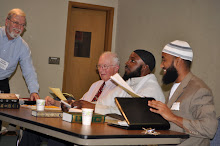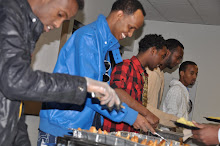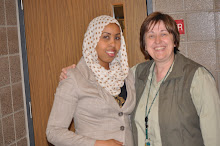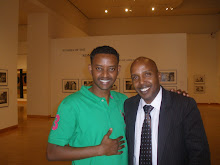

Saturday, September 12, 2009
Moving to Minnesota has brought many Somali women advanced educations and their own businesses. A high percentage of Somali-owned enterprises in the Twin Cities are run by women.
When Nimo Farah came to Minnesota at age 9, she didn't know to step on the foot bar to get water from the lavatory sink at her school, or to store textbooks in a locker rather than carrying them all home every day. Now 24, she's so skilled at navigating life here that she guides other immigrants through the confusing maze of real estate finance.
Farah is one of many Somali women in Minnesota who are pursuing ambitions ranging from professional careers to small-business ownership. As a mortgage manager for the Minneapolis-based African Development Center, she counsels first-time home buyers and helps low-income families obtain low-interest loans. One of her best friends, Zuhur Ahmed, also 24, hosts Somali-language radio and TV programs while applying to medical schools to become a pediatrician.
Dr. Saharla Jama, 32, is a dentist in St. Paul. Last spring, local Somalis Anab Gulaid and Farhiya Farah were among 14 recipients of a 2009 Bush Foundation Leadership Grant. By the estimation of local Somali associations, at least 80 percent of Somali-owned businesses in the Twin Cities -- many of them clothing shops and cafes -- are run by women.
Because the public voices of the Somali community tend to be male, people unfamiliar with the culture perceive women as being in the background, mostly focused on homemaking and raising children.
Dr. Saharla Jama
Joel Koyama, Star Tribune
Nimo Farah
Joel Koyama, Star Tribune
--------------------------------------------------------------------------------
"The popular belief is that Muslim Somali women can be lumped together as being passive and submissive," Nimo Farah said. "That's not true. They may not be trying to make a statement, but they are leaders."
Zainab Hassan, a program officer with the Minneapolis Foundation, moved to the United States 25 years ago. She has studied and surveyed the Somali immigrant community over the past several years.
"In Minnesota today, you will find more young Somali women going to college and finishing high school than men. Go to the Somali malls and you will see that most shops are owned by women.
Women are doing things; they just don't tend to seek out the spotlight. They have full-time jobs, families, children. They're busy."
In fact, before the 1990s civil war tore Somalia and its economy apart, it was common for women to work outside the home. Compared with many other African and Middle Eastern cultures, Muslim or not, Somali women have always been "more outgoing," said Hassan.
Bush grant winner Farhiya Farah recently went to see her regular hairdresser "to get my hair cut really short," she said. "When I asked her what she thought of Somali women, she said, 'A Somali woman will come in and get a short haircut. An Ethiopian woman will ask her husband first.'"
Missing role models
Women have always run Somali households, but moving to the United States has led to greater independence born not of expectation, but necessity. Many women came to Minnesota in the 1990s as single parents, with several children to support, their husbands killed in the war, missing or unable to get the priority visas given to refugee women and children. They had to get jobs or learn a trade, whether they wanted to or not.
"The reality is that the society you're in pushes you to do what you have to do," said Jama, the dentist. "Here, both mother and father have to work, or you have a single-parent household with everything up to the mother. That has facilitated a lot of what's happening."
Now, their daughters are taking things a step or two further. So are their sons, but a gap between the achievements of young Somali boys and girls has the community concerned. Partly to blame is a lack of role models.
"There's a whole generation of role models missing," said Nimo Farah. "Men in their 30s and 40s were either killed in the war or they can't get here, or once they're here, they can't find the work they used to do. Here is this group of highly educated women and this group of men who are lost. That concerns a lot of us who want to get married [to Somali men]. But it's not the end of the world not to marry. I try to explain that to my mom all the time. When she was young, men were relied on for security."
Displacement has taken a psychological toll on Somali men, Hassan said: "If you come to a new country and can't do what you used to do and have to take a job driving taxi when you used to be a government official, you don't consider yourself a role model."
Learning early
Somali traditions dictate that girls are taught to help around the house from a young age, while boys are given more freedom. Girls also have stricter rules imposed on their behavior, including curfews.
"When you cook and clean and wash in between homework from early on, you learn how to work hard, be responsible and manage your time," said Farhiya Farah. "You also get a great sense of satisfaction from doing a job well. Boys miss out on that because they're more pampered and don't have as many chores."
"Most people say girls have the opportunity right now," said Zuhur Ahmed, who was motivated to become a pediatrician because her infant brother died without health care in Somalia. "But boys have more cultural pressure to provide for family and send money back home. They also have more risk of dropping out of high school and joining gangs. Anyone can do something bad if they want to, but because of our traditions, girls have more restrictions on their behaviors."
Several of the women credit their mothers with setting good examples, as well as fathers who encouraged them.
"My mom was a teacher in Somalia, educated in Arabic, but when she got here it was all new," said Nimo Farah. "I used to be amazed how she figured out the buses and how to get around a hospital."
Of her father, who joined the family here several years after they resettled and now works for a money-wiring service, she said: "When he goes back to Somalia, people there say if you have a daughter, you're a winner, because women are consistently sending home more money."
Working in an office mostly staffed by men isn't a problem for Farah because "I grew up around so many. My brothers respect me. I don't take B.S. from anyone."
Bush grant winner Anab Gulaid lives in Blaine with her husband, a cultural liaison for Eagan schools, and their four children, including infant twin daughters. She hopes to be accepted at the Humphrey Institute and earn a public affairs degree.
She thinks girls are doing better than boys because "there's a lot of temptation for teen boys and not enough guidance. Girls are taught a lot of skills from an early age, so they have more structure and discipline. I know women with six kids who are full-time students, and they manage it.
"In Somalia, after the war, the jobs that kept the economy going were the ones women did. Men are now going back to school because they can't do much here with their professional experience."
How Somali men feel about the changing roles of women is influenced by their generation, Gulaid said: "Older men might say women have changed, but in the younger ones I don't see any resentment. The men my age know the new stresses put on all of us, and how we all have to help out."
Mohamed Hassan, a planning analyst for Hennepin County, Humphrey Institute fellow and Somali community organizer, thinks false assumptions are made by many outside his culture concerning male/female equality.
"It all depends on one's family," he said. "When civil war broke out, families in the refugee camps survived by what women and girls could do -- cooking, taking care of other people's children, selling things. They had these skills and could find jobs; men didn't. Here, in this country, both men and women feel compelled to work to send money home to their families."
While not everyone interviewed was in consensus on all the factors contributing to the greater independence of Somali women, they agreed it is growing.
"There's a definite cultural shift going on," said Jama. "It's just a matter of time."
Kristin Tillotson • 612-673-7046


















































No comments:
Post a Comment